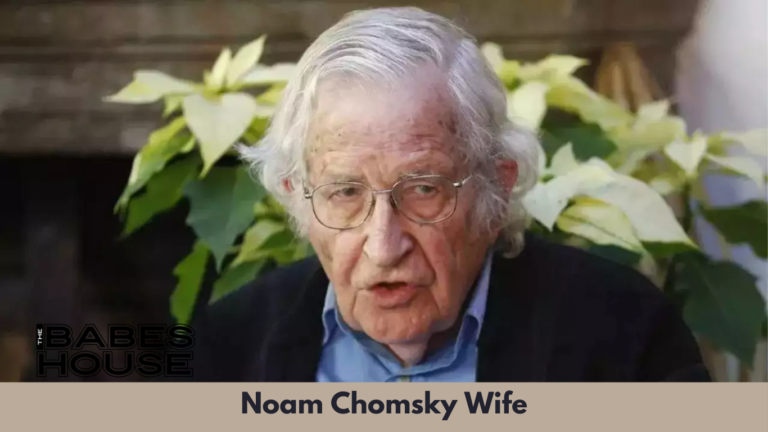Noam Chomsky is a renowned linguist, philosopher, cognitive scientist, historian, social critic, and political activist. Known for his groundbreaking work in linguistics and his sharp critiques of U.S. foreign policy, Chomsky has been a significant figure in academic and political spheres for decades. He taught at the Massachusetts Institute of Technology (MIT) for most of his career and, in 2017, joined the College of Social & Behavioural Sciences at the University of Arizona in Tucson.
What Were the False Reports About Chomsky’s Death?
Recently, social media was abuzz with false reports claiming that Noam Chomsky had passed away. These reports caused widespread confusion and concern among his followers and admirers worldwide. The rumors were debunked by Chomsky’s wife, Valeria Wasserman Chomsky, who clarified that the famed linguist was still alive. In an email to The Associated Press, she confirmed, “No, it is false.”
Why Was Chomsky Hospitalized?
Noam Chomsky, 95, had been admitted to a hospital in Brazil, where he resides with his wife. This hospitalization was related to his recovery from a stroke he suffered a year ago. Valeria Wasserman Chomsky had previously informed the AP about his condition, indicating that he was receiving care and continuing his recovery process.
What Did the Hospital Say About His Condition?
The Beneficencia Portuguesa hospital in Sao Paulo, where Chomsky was treated, issued a statement confirming his discharge. The hospital noted that Chomsky had been released on Tuesday to continue his treatment at home. This discharge indicates that while he may require ongoing care, his condition was stable enough for him to leave the hospital environment.
How Did Media Outlets Respond to the False Reports?
The false reports of Noam Chomsky’s death led to premature obituaries from several media outlets. Both Jacobin and The New Statesman published obituaries; however, these were quickly retracted or amended once the reports were confirmed false. Jacobin changed its headline from “We Remember Noam Chomsky” to “Let’s Celebrate Noam Chomsky,” while The New Statesman took down its essay by former Greek finance minister Yanis Varoufakis altogether.
What is Noam Chomsky’s Current Residence?
Noam Chomsky and his wife have had a residence in Brazil since 2015. This move has allowed them to live in a different cultural and political environment, which likely aligns with Chomsky’s lifelong interest in global affairs and his critiques of U.S. foreign policy. Despite his age and health challenges, Chomsky remains a significant figure in both academic and political discussions.
What is Chomsky Known For?
Noam Chomsky is known to millions for his incisive critiques of U.S. foreign policy and his pioneering work in the field of linguistics. He revolutionized the study of language with his theory of generative grammar, which posits that the ability to learn language is innate to humans. His work laid the foundation for much of modern linguistics and cognitive science.
Chomsky’s political activism is equally influential. He has been a vocal critic of various U.S. administrations, corporate power, and mainstream media, advocating for peace, social justice, and intellectual freedom. His books, lectures, and interviews continue to inspire and provoke thought among scholars, activists, and the general public.
How Has Chomsky Influenced Academia and Politics?
In academia, Chomsky’s contributions to linguistics are unparalleled. His theories have shaped research and teaching in cognitive science, psychology, and language studies. At MIT, he trained and influenced countless students who have gone on to make significant contributions in various fields.
Politically, Chomsky’s writings and talks have provided a critical perspective on global events. His analysis of power structures and media manipulation has influenced a generation of activists and thinkers. Books like “Manufacturing Consent,” co-authored with Edward S. Herman, dissect how mass media serves the interests of elite groups, shaping public perception and opinion.
What is Chomsky’s Role at the University of Arizona?
Since 2017, Noam Chomsky has been associated with the College of Social & Behavioural Sciences at the University of Arizona in Tucson. His presence at the university continues to attract students and academics interested in his work. Chomsky’s involvement at the university includes lectures, seminars, and collaborative research, contributing to the intellectual vibrancy of the institution.
What Can We Expect from Chomsky in the Future?
Despite his recent health challenges, Noam Chomsky’s commitment to his work remains steadfast. He continues to engage in public discourse, offering his insights on current events and ongoing global issues. His intellectual legacy is firmly established, but his ongoing contributions ensure that his influence will persist. As he continues to recover, the academic and activist communities look forward to his further participation and commentary.
Conclusion
Noam Chomsky’s life and work have left an indelible mark on both academia and political activism. The recent false reports of his death highlighted the global concern and admiration for him. Thankfully, he continues to recover and remain active in his pursuits. Chomsky’s legacy, built on decades of groundbreaking work and fearless critique, will undoubtedly endure, inspiring future generations to question, learn, and advocate for a better world.

